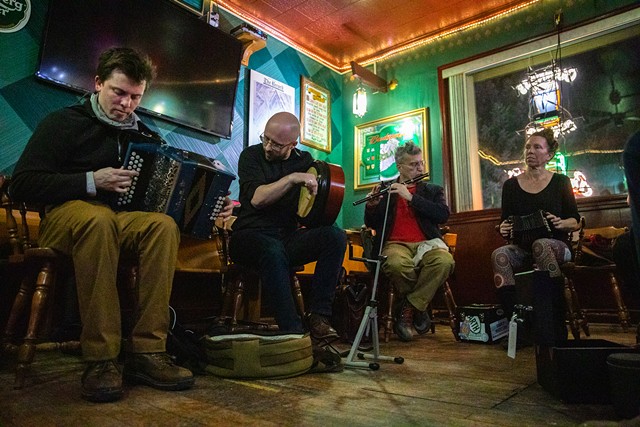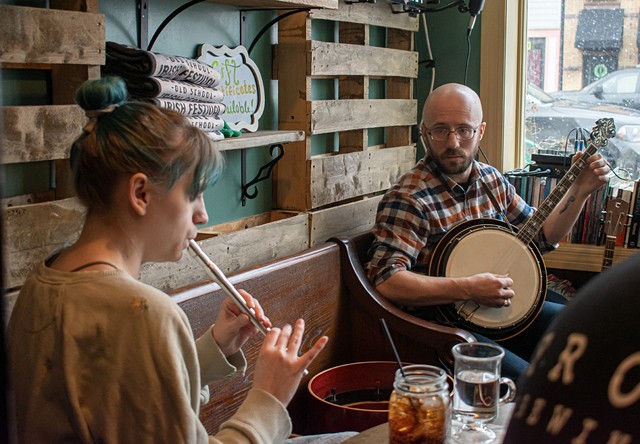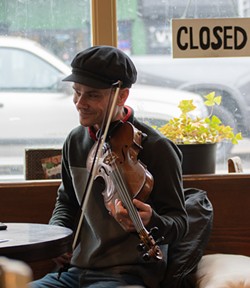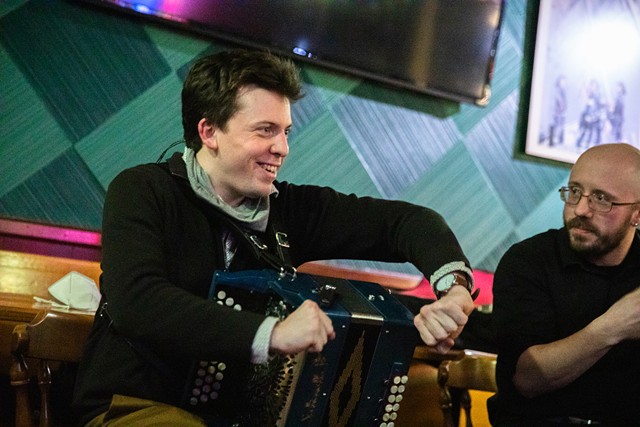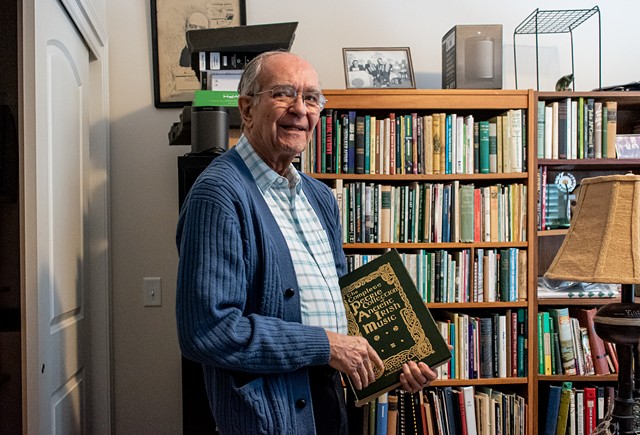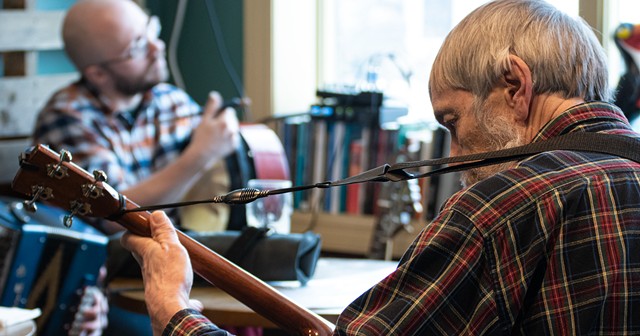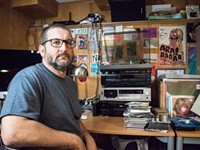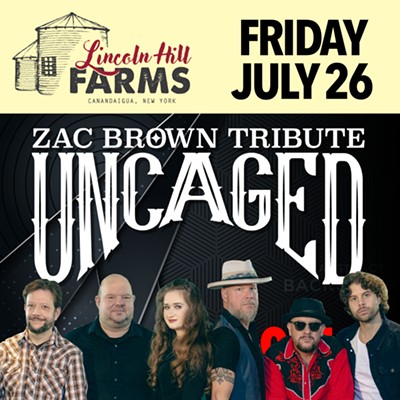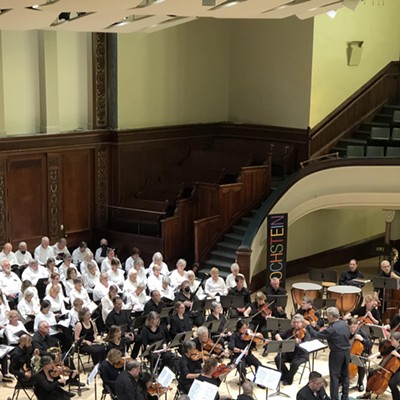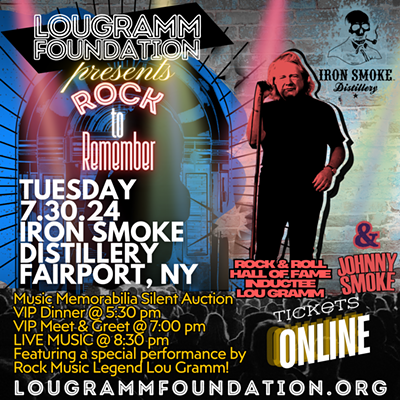[
{
"name": "500x250 Ad",
"insertPoint": "5",
"component": "15667920",
"parentWrapperClass": "",
"requiredCountToDisplay": "1"
}
]
The banjo player and the tin whistler in the corner of Barry’s Old School Irish, a cozy pub on Main Street in Webster with forest green walls and tartan-upholstered bar stools, were in the middle of a lively session before a good crowd on a recent blustery Saturday afternoon.
Then someone brought up the looming St. Patrick’s Day holiday, and the musicians could not contain their contempt.
Peri Malone on the tin whistle was annoyed at the annual pageantry of her Irish heritage being reduced to what she called “shamrocks and beer.” The leader of the session, Sean Rosenberry on the banjo, echoed the sentiment.
“It’s a bit frustrating to see this rich, nuanced culture reduced to a stereotype,” Rosenberry said.
For them and other devotees of the traditional Irish music scene around Rochester, promoting Irish culture is more than a once-a-year beer-soaked bar hop. Sessions, as the routine gatherings of musicians are known, are a means of preserving Irish identity.
Their music and everything it represents — a wordless communication between a people who have endured war, famine, economic ruin, and waves of emigration — date back to the Celtic communities of the Emerald Isle some 2,000 years ago.
Sessions are the essence of traditional Irish music. They can vary in size and quality, but they tend to hew to the same design. Musicians, usually anchored by a leader, gather at whatever tavern will have them, unpack their instruments, and play.
Sometimes a pair of musicians show up. Sometimes five or more. They show up at places like Johnny’s Irish Pub on Culver Road, which hosts two sessions on the last Sunday of the month, and Charlotte Tavern on River Road for the “Tuesday Tunes” session.
The gatherings are more art form than gig. Their players are not there to perform, but rather to create jigs and reels in the aural tradition, without the aid of sheet music. It is perhaps why so many Irish musicians have an ear for the melody of the tunes they play, but can’t recall their names.
Shawn Casey, a rhythm guitarist on the scene, said that listening has a lot to do with the magic of a session.
“The best musicians listen, and they never put in too much,” he said. “They put in what’s needed, and sometimes playing nothing is the best thing you can do.”
The music typically consists of a single melody played by fiddles, flutes, accordions, concertinas, or Uilleann pipes (an Irish bagpipe), often with the accompanying rhythm of an Irish drum known as the bodhrán. The tunes are played in simple keys such as A, C, D, or G, and typically consist of 16 to 32 bars.
“In terms of melodic content, in terms of chord structures, it’s very user-friendly,” said John Michael Ryan, a self-taught multi-instrumentalist on the scene who primarily plays the button accordion and concertina. “It’s pretty easy to pick up.”
Ryan, 33, who grew up with three Irish step-dancing siblings, started a weekly Irish music session at the now-closed Sheridan’s Pub on Mount Hope Avenue after returning from a summer spent in Ireland in 2010. Soon afterward, he launched the sessions at Barry’s.
“It's important to know that your ancestors weren’t the stereotype that you see every March,” Ryan said. “They were real people who had their flaws and their good points, like anybody else, but they had real traditions and real things that they actually engaged with, that aren't the plastic, leprechaun-y stuff that you see once a year. And it's important to keep those things around, because if not, all you have is the stereotype.” (Ryan is the partner of CITY life and culture editor Rebecca Rafferty.)
The origins of the Rochester “trad” music scene, as it is known, can be traced to the immigration boom following World War II and the establishment of private clubs by Irish immigrants to promote fellowship and preserve their heritage.
When the Harps Club was opened on Buffalo Road in 1959 by the Gaelic Athletic Association, it was riding a revival of traditional Irish music after decades of the sound being cast as backwards “bog music” unfit for modern times. That began to change with the founding of the Comhaltas Ceoltóiri Éireann (or “Society of the Musicians of Ireland”) in 1951.
It was not until 1973, though, that the Harps Club would begin hosting sessions. They were launched that year on a monthly basis by button accordion and concertina player Ted McGraw, who today is widely considered the godfather of Rochester’s traditional Irish music scene.
The Harp Club sessions later moved to the Friendship Tavern on Lake Avenue, where they became weekly occurrences. McGraw recalled one that included some extreme instrumentation: three hammered-dulcimer players, three upright bassists, and 17 fiddlers.
“I always welcomed everybody — even bad players,” McGraw said.
He and other session musicians organized formally in 1986 when they collectively became the Rochester Irish Musicians’ Association, also known as the Tom Finucane Branch of Comhaltas Ceoltóiri Éireann.
McGraw, now 84, said the quality of melodies set traditional Irish music apart.
“When’s the last time you heard a modern tune on the TV or radio that you could pick up a handle and take it along with you?” he said. “There are very few pieces of music you hear these days that have a melody to them.”
McGraw played tens of thousands of those melodies over the airwaves during the 43 years he hosted his weekly radio show, “Irish Party House,” on WXXI Public Broadcasting. The show was a Sunday afternoon mainstay for people of Irish heritage, whom McGraw greeted each week with a cheery Gaelic reception of “Cead mile failte,” meaning “A hundred thousand welcomes.”
When McGraw retired the show in 2017, fellow Irish musician Dave Halligan remarked to the Democrat and Chronicle that the show kept people of Irish heritage connected.
“Once a week, when you were listening to that show, you knew that people from all the different elements of the Irish community were listening at the same time,” Halligan said at the time. “Our hearts and souls were together for that one hour.”
Halligan, an accordion and flute player, said in a recent interview that sessions serve the same purpose, acting as both a social network and training ground for practitioners and admirers of an ancient Irish tradition.
“I think it’s the music and the interaction, the camaraderie and the friendship between musicians,” Halligan said. "It’s the community of musicians who are connected through their hearts and their spirits, through this music. They share tunes, and they share stories.”
Daniel J. Kushner is CITY's arts editor. He can be reached at [email protected].
Then someone brought up the looming St. Patrick’s Day holiday, and the musicians could not contain their contempt.
Peri Malone on the tin whistle was annoyed at the annual pageantry of her Irish heritage being reduced to what she called “shamrocks and beer.” The leader of the session, Sean Rosenberry on the banjo, echoed the sentiment.
“It’s a bit frustrating to see this rich, nuanced culture reduced to a stereotype,” Rosenberry said.
For them and other devotees of the traditional Irish music scene around Rochester, promoting Irish culture is more than a once-a-year beer-soaked bar hop. Sessions, as the routine gatherings of musicians are known, are a means of preserving Irish identity.
Their music and everything it represents — a wordless communication between a people who have endured war, famine, economic ruin, and waves of emigration — date back to the Celtic communities of the Emerald Isle some 2,000 years ago.
Sessions are the essence of traditional Irish music. They can vary in size and quality, but they tend to hew to the same design. Musicians, usually anchored by a leader, gather at whatever tavern will have them, unpack their instruments, and play.
Sometimes a pair of musicians show up. Sometimes five or more. They show up at places like Johnny’s Irish Pub on Culver Road, which hosts two sessions on the last Sunday of the month, and Charlotte Tavern on River Road for the “Tuesday Tunes” session.
The gatherings are more art form than gig. Their players are not there to perform, but rather to create jigs and reels in the aural tradition, without the aid of sheet music. It is perhaps why so many Irish musicians have an ear for the melody of the tunes they play, but can’t recall their names.
Shawn Casey, a rhythm guitarist on the scene, said that listening has a lot to do with the magic of a session.
“The best musicians listen, and they never put in too much,” he said. “They put in what’s needed, and sometimes playing nothing is the best thing you can do.”
The music typically consists of a single melody played by fiddles, flutes, accordions, concertinas, or Uilleann pipes (an Irish bagpipe), often with the accompanying rhythm of an Irish drum known as the bodhrán. The tunes are played in simple keys such as A, C, D, or G, and typically consist of 16 to 32 bars.
“In terms of melodic content, in terms of chord structures, it’s very user-friendly,” said John Michael Ryan, a self-taught multi-instrumentalist on the scene who primarily plays the button accordion and concertina. “It’s pretty easy to pick up.”
Ryan, 33, who grew up with three Irish step-dancing siblings, started a weekly Irish music session at the now-closed Sheridan’s Pub on Mount Hope Avenue after returning from a summer spent in Ireland in 2010. Soon afterward, he launched the sessions at Barry’s.
“It's important to know that your ancestors weren’t the stereotype that you see every March,” Ryan said. “They were real people who had their flaws and their good points, like anybody else, but they had real traditions and real things that they actually engaged with, that aren't the plastic, leprechaun-y stuff that you see once a year. And it's important to keep those things around, because if not, all you have is the stereotype.” (Ryan is the partner of CITY life and culture editor Rebecca Rafferty.)
The origins of the Rochester “trad” music scene, as it is known, can be traced to the immigration boom following World War II and the establishment of private clubs by Irish immigrants to promote fellowship and preserve their heritage.
When the Harps Club was opened on Buffalo Road in 1959 by the Gaelic Athletic Association, it was riding a revival of traditional Irish music after decades of the sound being cast as backwards “bog music” unfit for modern times. That began to change with the founding of the Comhaltas Ceoltóiri Éireann (or “Society of the Musicians of Ireland”) in 1951.
It was not until 1973, though, that the Harps Club would begin hosting sessions. They were launched that year on a monthly basis by button accordion and concertina player Ted McGraw, who today is widely considered the godfather of Rochester’s traditional Irish music scene.
The Harp Club sessions later moved to the Friendship Tavern on Lake Avenue, where they became weekly occurrences. McGraw recalled one that included some extreme instrumentation: three hammered-dulcimer players, three upright bassists, and 17 fiddlers.
“I always welcomed everybody — even bad players,” McGraw said.
He and other session musicians organized formally in 1986 when they collectively became the Rochester Irish Musicians’ Association, also known as the Tom Finucane Branch of Comhaltas Ceoltóiri Éireann.
McGraw, now 84, said the quality of melodies set traditional Irish music apart.
“When’s the last time you heard a modern tune on the TV or radio that you could pick up a handle and take it along with you?” he said. “There are very few pieces of music you hear these days that have a melody to them.”
McGraw played tens of thousands of those melodies over the airwaves during the 43 years he hosted his weekly radio show, “Irish Party House,” on WXXI Public Broadcasting. The show was a Sunday afternoon mainstay for people of Irish heritage, whom McGraw greeted each week with a cheery Gaelic reception of “Cead mile failte,” meaning “A hundred thousand welcomes.”
When McGraw retired the show in 2017, fellow Irish musician Dave Halligan remarked to the Democrat and Chronicle that the show kept people of Irish heritage connected.
“Once a week, when you were listening to that show, you knew that people from all the different elements of the Irish community were listening at the same time,” Halligan said at the time. “Our hearts and souls were together for that one hour.”
Halligan, an accordion and flute player, said in a recent interview that sessions serve the same purpose, acting as both a social network and training ground for practitioners and admirers of an ancient Irish tradition.
“I think it’s the music and the interaction, the camaraderie and the friendship between musicians,” Halligan said. "It’s the community of musicians who are connected through their hearts and their spirits, through this music. They share tunes, and they share stories.”
Daniel J. Kushner is CITY's arts editor. He can be reached at [email protected].
Speaking of...
-
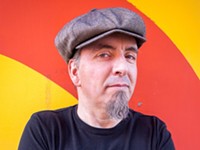
The F Word: Black market prom
Nov 1, 2019 - More »
Latest in Music Features
More by Daniel J. Kushner
-
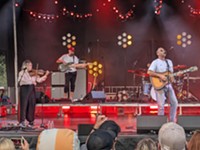
Concert Review | The Head and the Heart
Jul 25, 2024 -
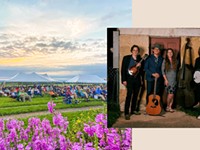
Where the bluegrass is always greener
Jul 19, 2024 -
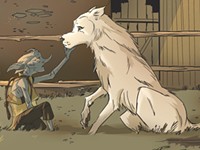
Illustrated escapism
Jul 15, 2024 - More »
